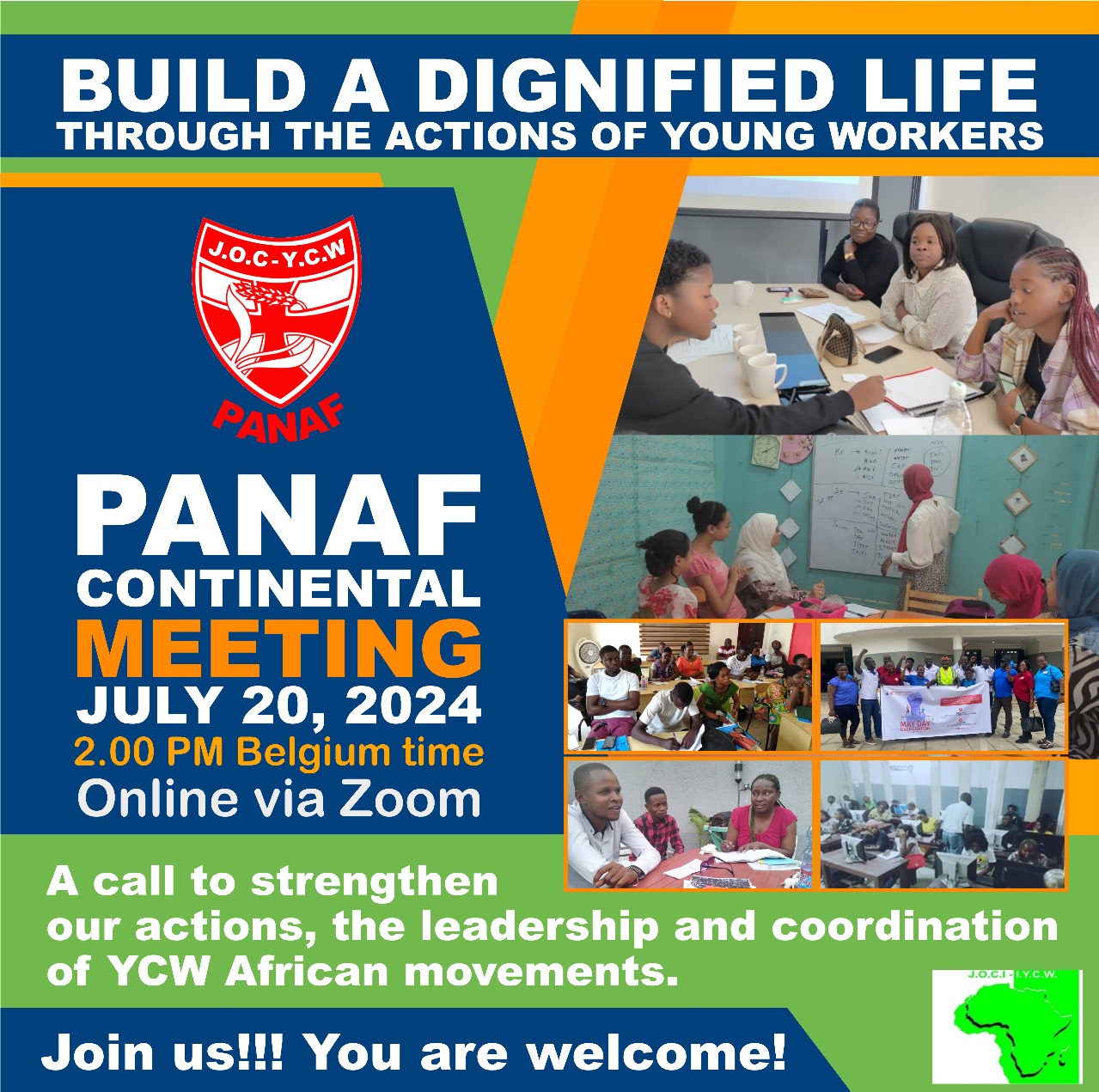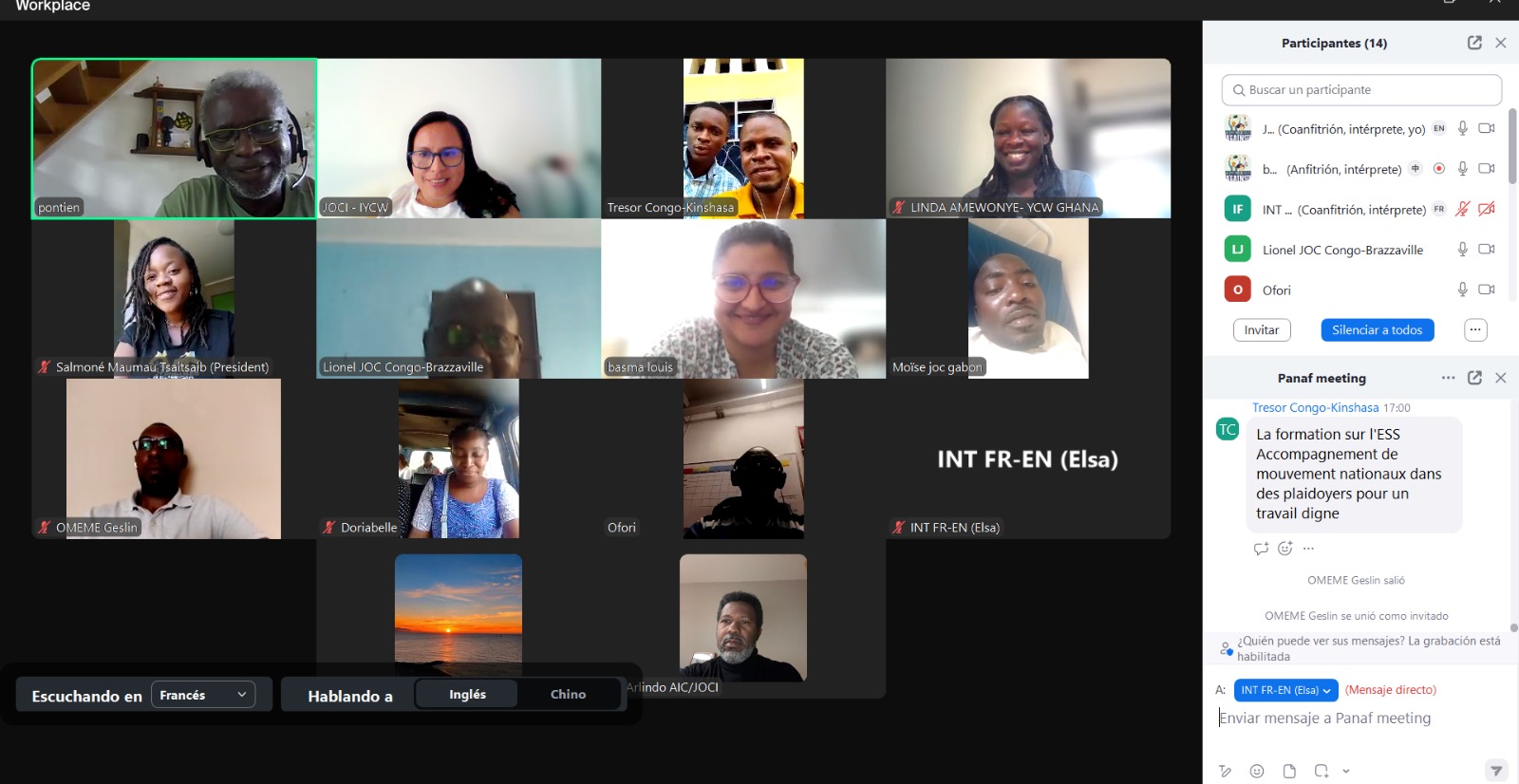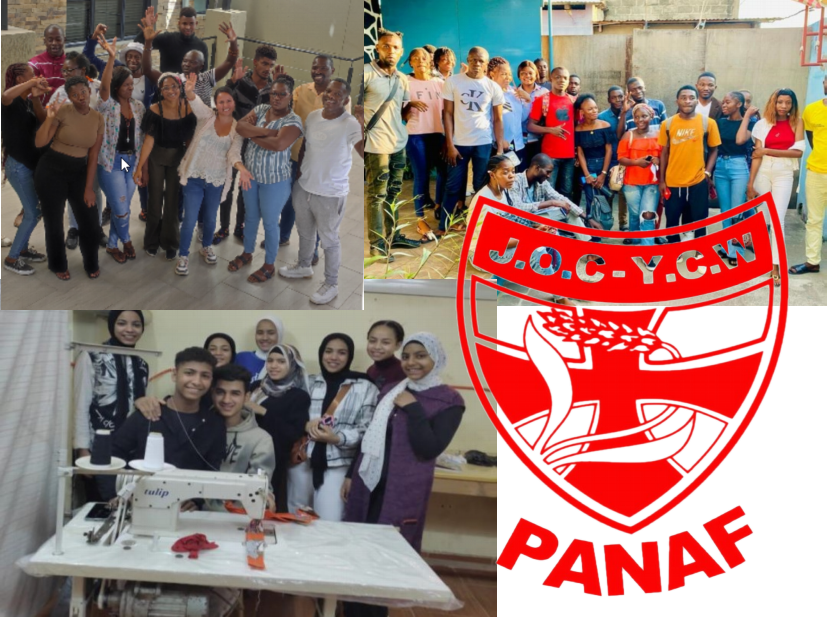
Once again, hope replaced the apprehension caused by the harsh reality of precarious work, unemployment or informal work experienced by thousands of young workers in Africa. Under the theme "Conquering a dignified life through the action of young workers", the representatives of the various PANAF movements were able to share their life stories, their experiences, their analyses and their alternative proposals for responding to the various challenges faced by young workers in their respective countries.
On 20 July 2024, a wonderful continental meeting took place between the African leaders of the YCW movements from Gabon, Congo Brazzaville, Congo Kinshasa, Egypt, Ghana and Namibia, and some members of the International secretariat of the YCW.
During the online event, the representatives were able to discuss the political, social, professional and educational situations that they and their peers experienced. They presented their vision of the main difficulties they face when trying to fulfil their dreams and aspirations. They were also able to discover together the causes, consequences and common aspects of their realities.
Notably, the lack of access to decent work was highlighted. It was noted that a growing number of young graduates do not have access to employment and are forced to work in the informal sector, without appropriate working conditions. It was noted that there is motivation for entrepreneurship and the creation of start-ups by young people, but that the basic conditions for their realisation, whether financial, technical or operational, are not provided for. It was pointed out that precariousness is more abrupt in the daily lives of women, who suffer from various types of gender-based discrimination.
This precariousness in the lives of young people is linked to the absence of youth-centered employment policies from public authorities and private initiatives. It is often due to the lack of access to qualifications and quality education for young people. But above all, it is due to the capitalist system, which imposes the pursuit of profit at the expense of the well-being of the greatest number.
The testimonies of the leaders bear witness to the achievements, the conquest of solidarity and the discovery of common identities brought about by the activity. Régis MBIYA, Congo Kinshasa: "During the debates, I learned about the different problems encountered by other countries and, above all, the solutions implemented to deal with similar problems. I met new people and was also able to observe the impact of young people on the development of the African continent. "
Miriam, from Egypt, added that "the strongest thing was that everyone shared their testimonies and their own reality, not just what is happening in our countries, but people came to share with great sincerity what is happening in their daily lives".
It was proposed that innovative measures be put in place to resolve the problems highlighted: demand that the government implement decent employment policies, as well as specific vocational training for young people and for society as a whole. A fairer distribution of the domestic wealth by investing in the potential of young people. It was also stressed that it was important to: promote different training areas with themes linked to the social and solidarity economy. Promoting arts and crafts workshops involving young people from the community, in order to train them and create jobs at the same time.

Within the movement, promote youth mobilisation activities such as a quarterly youth civic engagement days. Continue to promote education and training activities such as continental meetings with young people at grassroots level. Promote spaces that convey the feelings, concerns and make visible the reality of young Africans through podcasts containing random but empowering information for young people. It is also important that PANAF coordination makes regular visits to national movements in order to evaluate their activities and encourage them to undertake transformative actions.
The discussions and reflections motivated all the participants to take action: "Taking part in the meeting and discovering the experiences of other national movements gave us new ideas and solutions that we can adapt for the continuity of our projects and activities. In addition, the sense of solidarity and common purpose I felt during the meeting strengthened my motivation and commitment to my role within my national movement and to the aims of the YCW in general", said Linda from Ghana. For Tresor Mbalanda, Congo Kinshasa, the greatest challenge for the movement is to insist "that we should be real agents of change in our communities".
At the end of the meeting, Pontien Kabongo, the current adult collaborator of the IYCW, gave us an important presentation on the YCW methodology. According to him, the "See, Judge, Act" (SJA) method cultivates genuine commitment, becoming a culture of life and active involvement in the world. It seeks to align individual actions with meaningful collective change and social transformation towards a more democratic society.
The fundamental elements of the SJA method are: education as a lever for social change; the active participation of young people and their autonomy: a movement organised "Among them, by them, for them"; the starting point for action is the contradiction between everyday experience and aspirations; the method encourages the construction of its own knowledge through a constructive, dynamic, progressive and reciprocal process of personal and collective action.



 English
English  Español
Español  Français
Français